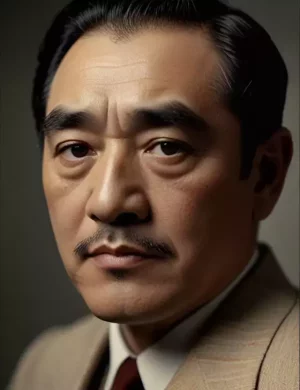Sessue Hayakawa
Early Life and Background
Sessue Hayakawa was born on June 10, 1889, in Nanaura, Chiba Prefecture, Japan. He was raised in a traditional samurai family and received a strict upbringing. Hayakawa initially pursued a career in naval engineering but eventually followed his passion for acting, enrolling at the Imperial Dramatic School in Tokyo.
Rise to Stardom
Sessue Hayakawa rose to international fame during the silent film era, becoming one of the first Asian actors to achieve stardom in Hollywood. He gained widespread acclaim for his role as Colonel Saito in the classic film 'The Bridge on the River Kwai' (1957), for which he received an Academy Award nomination for Best Supporting Actor.
Notable Films
Throughout his career, Sessue Hayakawa appeared in a variety of films, portraying a wide range of characters. He starred in silent classics such as 'The Cheat' (1915) and 'The Dragon Painter' (1919), captivating audiences with his powerful performances and commanding screen presence. Hayakawa's nuanced portrayals challenged stereotypes and paved the way for greater representation of Asian actors in Hollywood.
Cultural Impact
Sessue Hayakawa's impact on silent cinema and representation in Hollywood cannot be overstated. He defied racial stereotypes and broke barriers as one of the first Asian actors to achieve international stardom. Hayakawa's contributions to cinema have inspired generations of actors and filmmakers, and his legacy continues to be celebrated by audiences around the world.
Later Life and Legacy
After the decline of silent cinema, Sessue Hayakawa continued to work in film and television, both in Hollywood and abroad. He appeared in a variety of roles, showcasing his talent and versatility as an actor. Hayakawa's legacy as a trailblazer in cinema endures, with his contributions to the art form immortalized in film history.
Personal Life and Philanthropy
Outside of his acting career, Sessue Hayakawa was known for his philanthropic efforts and advocacy work. He was actively involved in promoting Japanese culture and heritage, as well as supporting charitable causes. Hayakawa's commitment to giving back to his community and preserving his cultural legacy left a lasting impact on the world beyond the realm of entertainment.
Legacy and Recognition
Sessue Hayakawa's contributions to cinema have earned him numerous accolades and honors throughout his career. He received a star on the Hollywood Walk of Fame in recognition of his achievements, and his legacy continues to be celebrated by film historians and enthusiasts. Hayakawa's influence on the film industry and his pioneering efforts in representation have left an indelible mark on the history of cinema.
